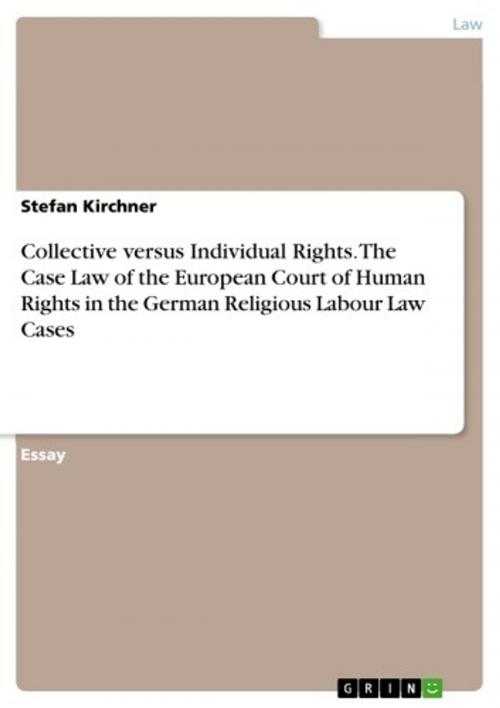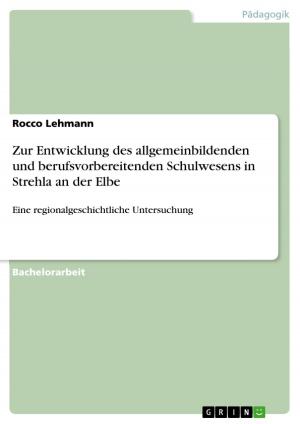Collective versus Individual Rights. The Case Law of the European Court of Human Rights in the German Religious Labour Law Cases
Nonfiction, Reference & Language, Law, International| Author: | Stefan Kirchner | ISBN: | 9783656971863 |
| Publisher: | GRIN Verlag | Publication: | June 2, 2015 |
| Imprint: | GRIN Verlag | Language: | English |
| Author: | Stefan Kirchner |
| ISBN: | 9783656971863 |
| Publisher: | GRIN Verlag |
| Publication: | June 2, 2015 |
| Imprint: | GRIN Verlag |
| Language: | English |
Essay from the year 2015 in the subject Law - European and International Law, Intellectual Properties, , language: English, abstract: Religious organizations which operate hospitals, kindergartens and other institutions are important employers. This is particularly the case in Germany, where institutions related to Christian groups, including the united evangelical regional churches and the Catholic church are the second most important employer after the public sector. At the same time is there a sense of increased secularization. This can lead to situations in which employees, while willingly employed by a religiously motivated organization, openly defy key rules of this religious group, e. g. when it comes to issues such as divorce or homosexuality. In the last years, a number of cases have made it through the court system in Germany and eventually to the European Court of Human Rights. By looking at some of these cases and the wider case law of that Court, this article is aimed at providing the reader with an overview over the topic but also with an answer to the question how the European Convention on Human Rights, which allows for a wide range of legal models concerning the relationship between the state and organized religions.
Docent Dr. Stefan Kirchner, Assessor jur., MJI is Associate Professor for Arctic Law at the Arctic Centre of the University of Lapland in Rovaniemi, Finland, and Adjunct Professor of Fundamental and Human Rights at the same university. His work focuses on the crossroads of human rights, the environment, shared areas, in particular the oceans and outer space, and international business and trade. Prior to joining the Arctic Governance Research Group at the Arctic Centre he taught public law, international law and civil rights as Visiting Professor for Transitional Justice at the University of Turin (Italy), University Lecturer and Associate Professor for Fundamental and Human Rights, with a Special Focus on Indigenous Rights, at the Faculty of Law of the University of Lapland in Rovaniemi (Finland), Assistant Professor for International Law and Associate Professor for the Law of the Sea at Vytautas Magnus University in Kaunas (Lithuania), scientific employee in the Department of Public Law of the Faculty of Law of Georg-August-University in Göttingen (Germany), and Visiting Lecturer at the Institute of International Relations at Tars Shevchenko National University in Kyiv (Ukraine) and at the Faculty of Law Justus-Liebig-University in Giessen (Germany). Formerly a practising lawyer (Rechtsanwalt) in Germany for over a decade, he has worked on international trade law, corporate law, the law of the sea and human rights law, including cases at the German Federal Constitutional Court (Bundesverfassungsgericht), the German Federal Supreme Court (Bundesgerichtshof), the German Federal Administrative Court (Bundesverwaltungsgericht) and the European Court of Human Rights. In addition, he served as legal agent for Germany's Federal Maritime and Hydrographic Agency, working on international shipping law, oil pollution and seafarer training issues. Dr. Kirchner is active in a number of professional organizations and is a regular reviewer for a number of academic publishing houses and academic journals, a member of editorial boards for several international academic journals and has written over one hundred academic articles and book chapters. He has been an evaluator of research projects for the Norwegian Academy of Sciences and Letters. Prior to his legal career he worked as a freelance journalist in Germany, as an emergency medical technician (Rettungssanitäter) for the German Red Cross and as a factory worker for a company producing transformers.
Essay from the year 2015 in the subject Law - European and International Law, Intellectual Properties, , language: English, abstract: Religious organizations which operate hospitals, kindergartens and other institutions are important employers. This is particularly the case in Germany, where institutions related to Christian groups, including the united evangelical regional churches and the Catholic church are the second most important employer after the public sector. At the same time is there a sense of increased secularization. This can lead to situations in which employees, while willingly employed by a religiously motivated organization, openly defy key rules of this religious group, e. g. when it comes to issues such as divorce or homosexuality. In the last years, a number of cases have made it through the court system in Germany and eventually to the European Court of Human Rights. By looking at some of these cases and the wider case law of that Court, this article is aimed at providing the reader with an overview over the topic but also with an answer to the question how the European Convention on Human Rights, which allows for a wide range of legal models concerning the relationship between the state and organized religions.
Docent Dr. Stefan Kirchner, Assessor jur., MJI is Associate Professor for Arctic Law at the Arctic Centre of the University of Lapland in Rovaniemi, Finland, and Adjunct Professor of Fundamental and Human Rights at the same university. His work focuses on the crossroads of human rights, the environment, shared areas, in particular the oceans and outer space, and international business and trade. Prior to joining the Arctic Governance Research Group at the Arctic Centre he taught public law, international law and civil rights as Visiting Professor for Transitional Justice at the University of Turin (Italy), University Lecturer and Associate Professor for Fundamental and Human Rights, with a Special Focus on Indigenous Rights, at the Faculty of Law of the University of Lapland in Rovaniemi (Finland), Assistant Professor for International Law and Associate Professor for the Law of the Sea at Vytautas Magnus University in Kaunas (Lithuania), scientific employee in the Department of Public Law of the Faculty of Law of Georg-August-University in Göttingen (Germany), and Visiting Lecturer at the Institute of International Relations at Tars Shevchenko National University in Kyiv (Ukraine) and at the Faculty of Law Justus-Liebig-University in Giessen (Germany). Formerly a practising lawyer (Rechtsanwalt) in Germany for over a decade, he has worked on international trade law, corporate law, the law of the sea and human rights law, including cases at the German Federal Constitutional Court (Bundesverfassungsgericht), the German Federal Supreme Court (Bundesgerichtshof), the German Federal Administrative Court (Bundesverwaltungsgericht) and the European Court of Human Rights. In addition, he served as legal agent for Germany's Federal Maritime and Hydrographic Agency, working on international shipping law, oil pollution and seafarer training issues. Dr. Kirchner is active in a number of professional organizations and is a regular reviewer for a number of academic publishing houses and academic journals, a member of editorial boards for several international academic journals and has written over one hundred academic articles and book chapters. He has been an evaluator of research projects for the Norwegian Academy of Sciences and Letters. Prior to his legal career he worked as a freelance journalist in Germany, as an emergency medical technician (Rettungssanitäter) for the German Red Cross and as a factory worker for a company producing transformers.















